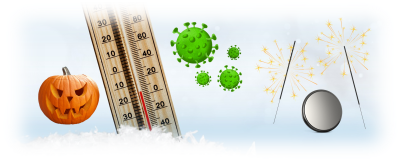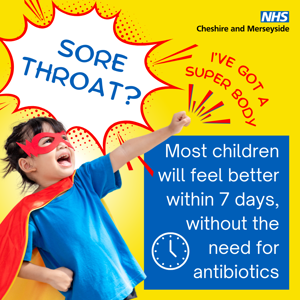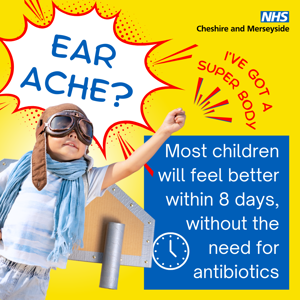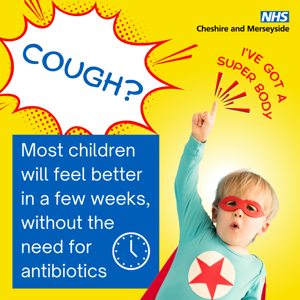Winter is upon on us. We have collated a few safety messages below to help keep you and your family safe and healthy during colder weather and darker nights. Please click on each section to view the information.


Flu is a nasty little bug that can give you a bad temperature, bad coughs and bad sneezes.
To prevent flu you should:
- Catch it - Catch coughs and sneezes with a tissue.
- Bin it - Put your tissue in a bin.
- Kill it - Wash your hands to stop any bugs from spreading.
You can fight the flu for a whole year, by having the flu nasal spray. There are no needles just a quick spray up each of your nostrils. It may tickle a little! And your eyes might water for a short time. If you can't have the flu spray there is another way you can fight the Flu.
NHS - All about fu and how to stop getting it (pdf)
Parents / Carers:
For more information about the new School Aged Immunisation Service, please visit the IntraHealth website.

Illnesses like coughs, sore throats and ear ache are extremely common in young children, but did you know… our children’s ‘super bodies’ are designed to fight off many common illnesses, without the need for antibiotics?
These common ailments and can be unpleasant for children and their caregivers, but are most often caused by viral infections and do not need to be treated with antibiotics.
Read more at Super Bodies using the link below:



Useful links and references:
Super Bodies
Alder Hay Symptom Checker
Healthier Together App
Think Pharmacy First
Safety information from Cheshire Fire and Rescue Service
Reporting unlit dangerous bonfires in Cheshire
If you spot a build-up of rubbish, intended to be used as a bonfire, please report it to the local council immediately.
-
Cheshire West and Chester - 0300 123 7026 - street care option 2.
This time of year is one of the busiest for firefighters, who often have to deal with nuisance deliberate fires.
We want you to enjoy celebrations, but to do so safely. We would always recommend going to an organised bonfire or firework display as it is much safer to do so.
Please use the link below to read a list of organised bonifire events in Cheshire.
Organsied bonifire events in Cheshire
STOP, DROP, ROLL
Always remember, if your clothing catches fire - STOP, DROP and ROLL.
If your clothes catch fire, running around won't help. You must always stop, drop to the ground (cover you face with your hands) and roll over and over. Make sure you roll over a few times, to ensure that you put the fire out.
This video explains how to stop, drop and roll:
First aid - following a burn or scald
Good first aid following a burn or scald can make an enormous difference in recovery times and the severity of scarring. Remember to COOL, CALL, COVER.
First aid advice from the British Burn Association:
Cool the burn with running cold tap water for 20 minutes and remove all clothing and jewellery (unless it is melted or firmly stuck to the wound).
Call for help: 999, 111 or local GP for advice.
Cover with cling film or a sterile, non-fluffy dressing or cloth. Make sure the patient is kept warm.
This video explains how to cool, call, cover:
Useful links and reference:
Bonfire Night Organised Events - Cheshire Fire and Rescue
Firework Safety - RoSPA
Fireman Sam Firework and Bonfire Safety Tips - CAPT (pdf)
Halloween Costumes and Fancy Dress
What are the risks surrounding fancy dress?
Whether for a specific occasion like Halloween, or simply playing around the house, young children love to dress up. Unfortunately, fancy dress clothing has been implicated in a number of serious accidents.
Toy dress-up clothing can burn rapidly when accidentally ignited by contact with an open flame, such as a candle or open fire. This can cause serious injury, burns, and potentially death. Children are especially vulnerable in circumstances when they are playing without adult supervision.
Advice for parents
- Check that all Halloween and fancy dress costumes you buy carry a UKCA or UKNI mark on the label
- As with all clothing, Halloween and fancy dress outfits should always be kept away from fire, lit candles and all other naked flames
- If lit candles are part of your celebrations always follow their safety guidelines, and remember:
- Always supervise children and pets if using lit candles
- Do not allow children to carry, play, reach over, light or be near lit candles
- Never leave a burning candle unattended
- Remember always to extinguish a candle completely after use
- Take care when using candles at Halloween. Do not carry pumpkins with lit candles inside, consider using battery-operated candles instead
- Children should always be supervised by a suitable adult
- If fireworks are part of your celebrations, follow the Firework Code (see RoSPA fireworks safety page for more information)
- Be aware that homemade fancy dress costumes or those not tested to the same flammability standards may ignite easily and burn quicker
- Ensure children can be seen in the dark; ideally they should wear something reflective such as a reflective strip, and carry a torch.
Useful links and reference:
Halloween Safety - CAPT
Halloween Costumes and Fancy Dress - RoSPA
Firework Safety - RoSPA
No Trick or Treaters Posters (Cheshire Police) - pdf
Ice safety and winter water safety
Children are attracted to frozen lakes, canals and Lochs as they present natural play opportunities. Ice, however, can be a serious hazard in the UK in the winter.
We most often hear of people falling through the ice as a result of incidents with dog walkers, ramblers, and members of the public where it is used as a walking route/shortcut, or through play.
Ice safety advice for visitors to waterways
- Plan your route if you’re going out and about near waterways in winter
- Look out for the signs and warnings. They are placed to warn of non-obvious hazards
- Stay off the ice and frozen waters they will not be able to hold a person’s weight
- Keep away from the edge, and be aware that snow and leaves may obscure the edge
- Supervise children around ice and waterways
- Keep your dog on a lead near ice and frozen waters and don’t throw sticks or balls onto the ice for them.
If you see a person in the water:
- Call 999 and shout for help
- Stay off the ice: Help from the land to the best of your ability. Try to keep your eyes on the person at all times, especially in moving water
- Shout to the casualty to keep still to maintain heat and energy, use a calm reassuring voice if possible: Float To Live
- Look for rescue equipment or anything that will extend your reach such as a rope, pole, branch or item of clothing.
- Reach or throw out to the casualty with it. Gently guide and move the person to the shore. Make sure that you are on stable ground.
- Keep the casualty warm and make sure they go to hospital.
Useful links and reference:
Ice safety and winter water safety - RoSPA
Water safety signs to look out for - RoSPA
Winter Water Safety Poster (RLSS) - pdf
Cold Water Shock - RLSS
Winter Water Safety - Canals and River Trust
Christmas is a time when your home is likely to be full of people, and it's in the excitement of the season that accidents can easily happen.
But one of the good things about Christmas is that there are typically more people around to supervise children and, with a little more care and forward planning, most accidents could be avoided.
Christmas Decorations and Novelties
Christmas decorations and novelties come in all shapes and sizes, and many of them look like toys and are attractive to children. But the problem is, they don’t adhere to the same safety standards as toys, and so should not be given to children to play with.
Children under 36 months are at the greatest risk, as the most common problem is decorations having parts that can easily be pulled off and put in the mouth, posing a choking risk.
To ensure you know what you are buying, check the small print on labels. Phrases such as "this is a decoration, not a toy", "keep out of reach of children", or "for use as a decoration only" will mean the product does not adhere to toy safety standards.
Useful links and reference:
Christmas Safety - RoSPA
Christmas Decorations and Novelties - RoSPA
Toy Safety - RoSPA
Fire Safety (inc. Plug Socket Overloading) - CATP
6 Simple Safety Tips - CAPT
Online Home Fire Safety Check - HFCC
Christmas Guidance - GovUK
Button batteries are small round, silver batteries found in lots of electrical toys and devices.
If your child swallows a button battery or you think they may have swallowed one, take them to A&E straight away.
As well as being a choking hazard, button batteries can cause internal burns, internal bleeding, and in some cases, even deaths.
They can also cause burns if they're lodged in a child's nose or ear.
Dangers of button batteries to children
Safe use of button batteries - parental guidance
Useful links
Useful resources
Button Batteries Flyer - CAPT (pdf)
Button Batteries Poster - CAPT (pdf)
Button Batteries Factsheet - CAPT (pdf)
Button Batteries Factsheets in Community Languages - CAPT (pdf)

